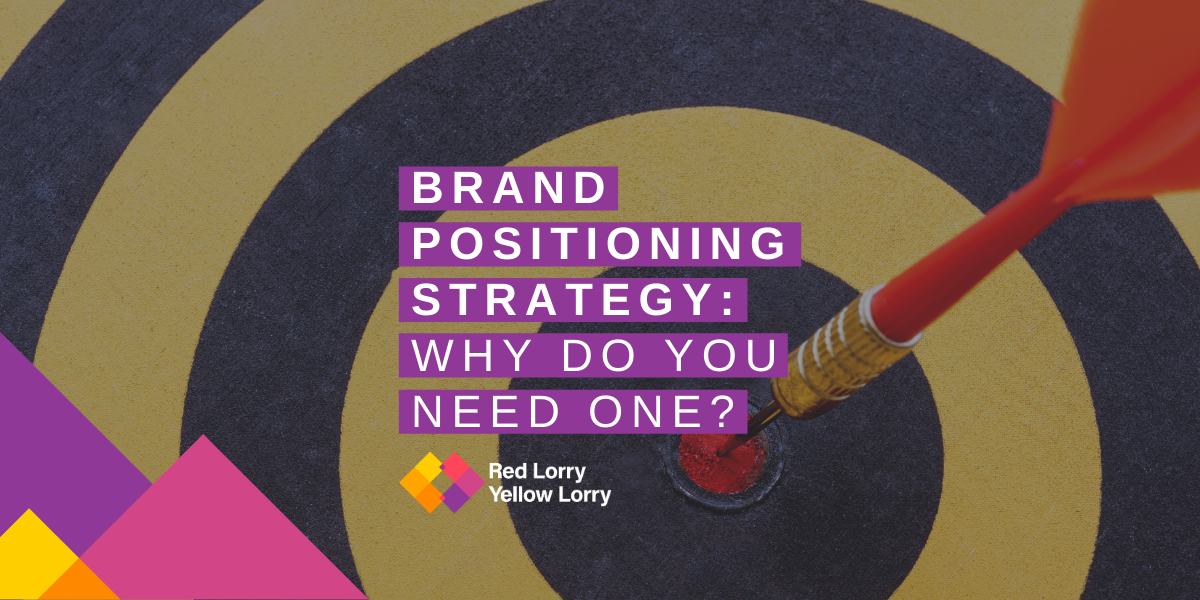With so much competition across virtually all industries, it has never been more important for brands to have a firm understanding of, and strategy behind, their brand positioning. Simply put, it’s not something they can afford to take lightly.
And this is as true for b2b brands as it is for b2c. Although there are some differences between the two when it comes to the way people interact, engage and build relationships with companies, one thing they have in common is the importance of a brand’s position in the market. This means being able to tell a compelling brand story is just as important as talking about a product’s features and price point.
Here at the lorries, supporting clients with their brand positioning is one of our core services (along with audience engagement and lead generation). So, let’s take a closer look at what it actually means and why it’s so important.
What is brand positioning?
Broadly speaking, it refers to the way a brand differentiates itself from its competitors and where, or how, it sits in the minds of customers. As The Branding Journal explains, a brand positioning strategy involves “creating brand associations in customers’ minds to make them perceive the brand in a specific way.”
If done well, it can have a colossal impact on a brand’s success. For example, crafting a distinct and consistent brand story can help businesses stand out from the crowd. It can also drive customer loyalty, increase brand awareness and help to establish a relatable identity with target audiences – which b2c brands such as Apple and Nike have done to great effect.
But the impact certainly isn’t limited to consumer-facing companies. Effective brand positioning can also translate into tangible business benefits in the b2b world, as emphasised by the 77% of b2b marketing leaders who believe that branding is critical to growth. According to a study by consultancy Spencer Brenneman, 82% of businesses that invested more in their brand strategies saw their investments pay off, with increasing sales and landing additional customers being the two biggest wins.
If that doesn’t convince you, just take a look at the world around you. From Salesforce and Slack to Microsoft and Cisco, there are plenty of examples of b2b brands that have spent years cultivating a distinctive position and are now synonymous with certain qualities.
The key question for smaller brands that don’t have the same resources as global enterprises, is what do you need to do to create a brand story that differentiates you from your competitors?

Suggested Post
Rapid response PR: four things to consider
It’s always important for PR professionals to stay on top of the news agenda, especially in the fields related to their business. Not...
Read MoreFinding your place
Ultimately, a successful brand positioning strategy starts by truly understanding your markets and audiences. Without insights into how your brand is perceived in the market, what your customers are talking about and what their biggest pain points are, you’ll never be able to engage audiences in an effective way.
Whenever we work with a new client, we always take the time to evaluate current awareness and sentiment in order to understand where the brand currently stands. We also do a lot of social listening to monitor trends, hot topics and competitors, all of which then feeds into the positioning strategy and the content we create.
And central to the content production process is telling the right story. One that is authentic, taps into emotions, speaks to potential and existing customers at a human level, and adds value by providing solutions to the challenges your target audience is facing.
This creates deeper connections than simply trying to sell a product, especially if content is written in a way that will specifically engage and influence the people you’re trying to reach.
Because b2b storytelling isn’t just about telling an interesting story. It’s about telling it in the right way and delivering messages that appeal to people’s emotions. Not only can this help to evoke positive feelings towards your brand (such as trust, reliability, credibility etc), it can also make your brand much more memorable.
Clearly, in a time where companies are fighting for attention, the importance of building a strong brand can’t be underestimated. Brand positioning definitely matters in b2b. All that’s left to do now, is to go and carve out your niche.
Do you need help developing the right story, message or tone of voice as a part of your brand positioning strategy? Drop us a line at hello@rlyl.com or visit our contact page.
Sign up to our newsletter now



